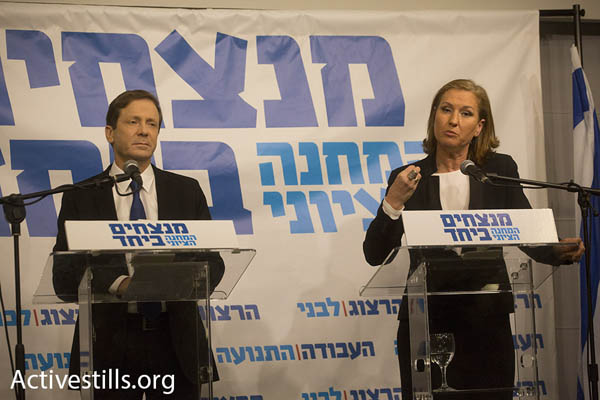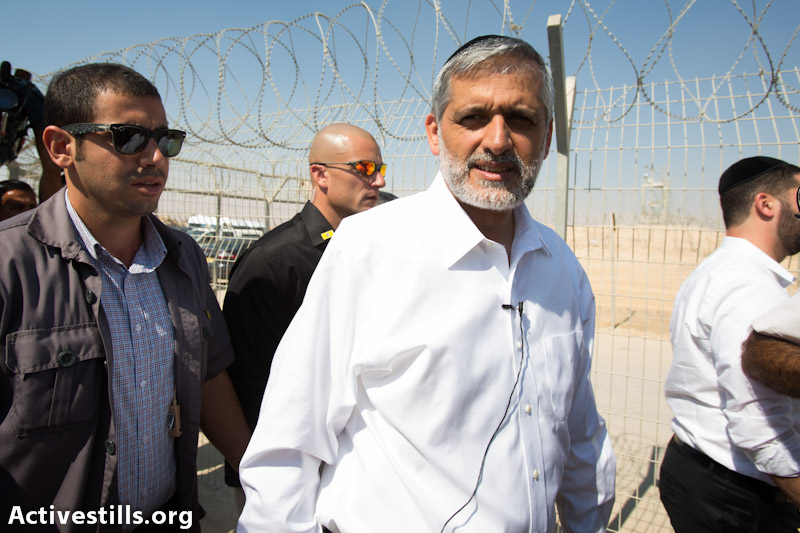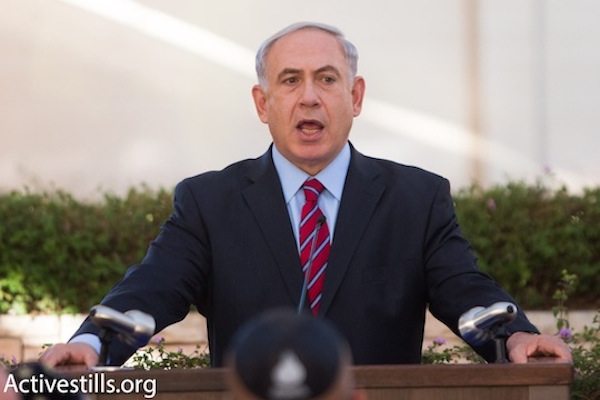As they head into elections, Netanyahu, Livni, Herzog, Lapid and Yishai can agree on one thing: even after nine military operations in 14 years, the only solution to the conflict with Gaza is another war with Hamas.
By Yonatan Mendel
Election season is upon us, which means that the country’s best copywriters and campaigners are likely gathering with elected officials in meeting rooms in order to come up with a concise and clear message for the citizens of Israel – one that will inspire them to vote for those very same elected officials, and the brighter future they promise. Politicians and their PR experts know there are several formulas that work extremely well in these situations. Scare tactics are always good, since after all, this is a “tough neighborhood” and the difficult reality that surrounds us always work in the politicians’ favor. No less important is maintaining the same message that the public expects to hear, without inserting original statistics that will force the public to reprocess the statistics it has become accustomed to hearing.
In other words, if over the past 14 years and nine military operations against Hamas in the Gaza Strip (Operation Rainbow, Operation Days of Penitence, Operation First Rain, Operation Lighting Strike, Operation Summer Rains, Operation Hot Winter, Operation Cast Lead, Operation Pillar of Defense, Operation Protective Edge) – operations that proved, one after another, that despite thousands killed and indescribable damage, there is no military solution to rocket fire – Israel’s leaders are now promising us a new dawn, and are preparing the ground for the next unnecessary war.
On the right is Prime Minister Benjamin Netanyahu, who understands the unique qualities of fear. He recently reminded us by using the magical word: “Hamas.” A week ago, in a closed meeting with members of his Likud party, Netanyahu said that Labor’s Isaac “Buji” Herzog and Tzipi Livni are not able to manage the country, using his iron fist against Hamas as an example.
“If they are elected, who will take care of Hamas and the Islamic State?” asked Netanyahu to the chuckling crowd. “Who will take care of them? Buji? Tzipi?” The use of the dorky-sounding Buji-Livni combination, when juxtaposed with those “scary” Arabic words, has quickly turned into the rabbit Netanyahu pulls out of his hat at every opportunity. Netanyahu repeated the mantra just two days ago at the Likud’s election campaign launch party. “I just want to ask you whether Buji and Tzipi will maintain the security of Israel’s citizens.” He let the crowd boo, before quieting it down with another question: “Will Buji and Tzipi stand up to Hamas? Hezbollah? Iran?”
Using Hamas as an eternal and unchanging enemy, while ignoring the opportunity provided by a Palestinian unity government – which has been accepted by the leadership of both Fatah and Hamas – will likely continue the main component of Netanyahu’s election campaign. Netanyahu will promise Israelis, even if vicariously, more war and more deaths, all the while knowing that those will never lead to strengthening Israel’s security.
The fighting opposition
It is interesting, then, to look at what line Netanyahu’s rivals in Livni and Herzog’s “Zionist camp” are pushing. On their first day on the campaign trail the two took a trip to the south, where they toured the towns surrounding the Gaza Strip, hinting that they too have something to say about the security situation, not to mention Hamas. There, on the border with Gaza, the duo harshly criticized the prime minister’s conduct during the last war, in which over 2,000 Palestinians and more than 70 Israeli soldiers were killed in just five weeks.

“Operation Protective Edge achieved deterrence and security,” said Livni, “but the real test will be the long run.” She then emphasized the difference between her party’s stance and that of Netanyahu’s when it comes to conduct vis-a-vis Hamas: “The prime minister has written wonderful books on how to fight terror, but in the end he is the one who speaks and negotiates with them. Unfortunately, Netanyahu does not differentiate between a military front and a political one, and he is weak in the face of terror.” Following this, Livni presented her and Herzog’s own, original security policy. According to Livni, “Hamas is a terrorist organization and there is no hope for peace with it… the only way to act against it is with force – we must use military force against terror… and this is instead of Netanyahu’s policy to come to an agreement with Hamas.” Herzog was quick to support Livni’s position, which attacked Netanyahu for being a compromising peace-seeker, adding that “there is no compromising with terror.”
It is interesting to note that even new parties interested in maximizing their election chances are rushing to use the ever-promising word “Hamas,” all while signaling to their electorate that they have not forgotten them – that they too promise the same road that leads to victimhood, death, murder and blood. Eli Yishai, head of the new “Ha’am Itanu” party and and former member of Shas, made an original move and opened his election campaign in rocket-hit Sderot. There he promised a different future for the local children.
“I promise to prevent giving up territory,” said Yishai, before promising to “block the release of murderers.” But not before he reached the key sentence in his speech: “I established a party in order to look after you… after Israel’s citizens. For you, dear residents of Sderot, who live in a reality in which the Hamas terrorist organization conducts experiments on you through rockets shot over your head, and no one does a thing to stop it.” Yishai won a loud round of applause. Here, they said, we have finally found a real leader who is calling for an iron fist against the Gaza Strip.

And as if that weren’t enough, even Yair Lapid’s campaign feels oddly similar to that of Livni, Herzog and Yishai, in order to finally ensure that Israelis are able to choose between one bad choice or another. Lapid thought and thought about who he should recruit to his party, before it finally it hit him. Not surprisingly, he chose Haim Yalin, Chairman of the Eshkol Regional Council in southern Israel. Who said that no one is supporting the south? Even Lapid understood that in order to get elected he will need to hug the residents of the south and make sure that he promises them the same failing policy that will never actually allow them to live in security. “Is there any doubt that at some point Hamas will return to firing mortars at the towns surrounding Gaza?” asked Lapid, immediately promising that he will de-militarize the Strip, and that he – and only he – will fight Hamas, which according to him is an “Islamist, terrorist organization of the worst kind.”
A non-military alternative?
In the face of all these different-similar-identical voices, it astounding to listen to the words of the new Gaza Division Commander, Brigadier-General Itay Virov, who entered the position right after Operation Protective Edge. I cannot believe that I am writing this, but I am amazed to see that this organization, whose entire purpose is to fight and is directly responsible for the deaths in Gaza, is trying to signal to Israelis that thinking inside the box – mantras of “might makes right” and “let’s try the same solutions that have failed until now” – must change.
Virov recently spoke with the Israeli residents of the Gaza area, opening his remarks with a rather dramatic point. Despite the shallowness of Netanyahu and his rivals, Virov does not believe Hamas is the Islamic State, and that the Islamic State is Hamas. In Sinai, according to Virov, there are developments connected to IS, but this is not the situation in Gaza. He also said that the fact that Israel did not overthrow Hamas was a good thing, “since a situation of chaos inside the Strip will lead to a more difficult and complex situation than before the war.”

Virov continued by speaking about Israeli deterrence, which Netanyahu, Livni, Herzog, Yishai, Lapid, Liberman and Bennett would certainly have proudly supported. But according to Virov, “we can look at the Shuja’iyya neighborhood in Gaza and understand that thinking about deterring anyone there is pretentious, not to mention arrogant. What does someone in Shuja’iyya stand to lose from such a war? How much worse can it get for him?”
WATCH: Four minutes of terror in Shuja’iyya
Virov continued and stated that there is no real way of deterring Hamas in Gaza. As opposed to the Israeli leadership, he did not tell lies to the residents of the south a moment before the election. Instead he simply said: “What will the residents of Gaza be deterred from? How much worse can it get for them? If we cannot deter them so that they think twice about the next war, while also remembering the previous one, what is the point of this war in the first place?”
“Gaza is a huge tragedy,” said the officer. “It has no resource reserves. It has nothing. This makes it even more complex. If there is no deterrence – and I am saying this as honestly as possible – the next war will not be a war of deterrence.”
It is unbelievable that in the year 2015, a brigadier-general in the IDF, who wears the uniform and carries a weapon sounds like Mahatma Gandhi when compared to the politicians of the right and the center-left. They, the masters of war, tell the citizens of Israel not to worry, because voting for them means that things will become bad once more. There will be another war, they promise. No worries – they promise to repeat all the mistakes of the past. They promise not to think out of the box, not to take responsibility, not to apologize for the mistakes they have made and the opportunities they have missed. They promise not to rethink Israeli policy or move toward a deal the Palestinians, for instance through declaring that we will talk with the Palestinian leadership that is seen as legitimate in the eyes the Palestinian public. With no preconditions or clichés.
It is time to understand, despite the delay and the immense harm the Israeli leadership has caused its citizens, that Hamas is not an organization that will be taken down overnight. Much has been written about the fact that Hamas is part of Palestinian political life, about the fact that it was a grassroots organization or that it is strengthened every time Israel goes on another hopeless military adventure. The first leader who will dare to say so will be seen as irrelevant and non-patriotic. The leaders who will continue to run their election campaign based on making false military promises from the past – they will continue to bring about a disaster for all of us.
Yonatan Mendel is the projects manager of the Mediterranean Unit at the Van Leer Jerusalem Institute, and co-editor of the book review section of the Journal of Levantine Studies (JLS). This article was first published on +972′s Hebrew-language sister site, Local Call. Read it in Hebrew here.
Related:
On Gaza, differences between Labor and Likud are superficial
+972’s Story of the 2015: Gaza
PHOTOS: In Gaza, rebuilding is still over the horizon



